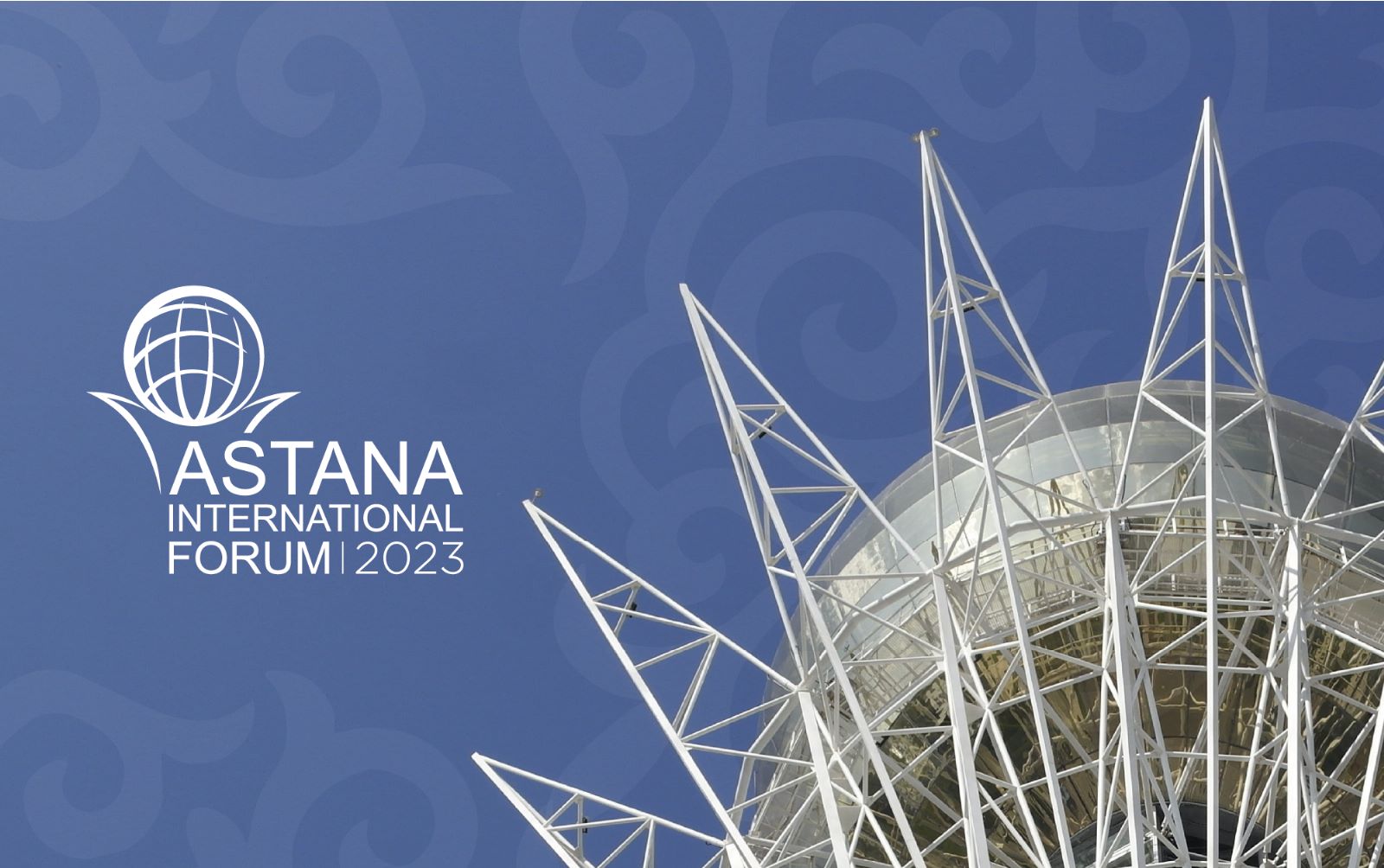Kazakhstan is a country noted for its warm hospitality. A guest in a Kazakh home is treated with great honor and offered a delicious meal and the delights of traditional Kazakh tea. That spirit of hospitality felt throughout the centuries now extends to modern Kazakhstan’s role in fostering international cooperation. As a result, Kazakhstan continues to open its doors to the world, offering a receptive space for exchanging ideas and building collaboration.

Official poster of Astana International Forum 2023.
For two days this summer, Kazakhstan will play host to a gathering of global significance, bringing together stakeholders from across the world to discuss challenging issues related to the economy, energy, climate, and regional cooperation and development. The Astana International Forum, organized by the Government of Kazakhstan, will take place on June 8-9. The forum is the latest offering in a long series of efforts by Kazakhstan to promote dialogue amongst leaders from various regions and industries.

Assel Nussupova.
Since becoming an independent country in 1991, Kazakhstan has hosted numerous international events that helped to foster understanding between nations and to reshape the global order for better regional security, economic stability, and environmental protection.
Located at the east and the west crossroads, Kazakhstan, with its vast territory and rich abundance of mineral resources, has historically played a unique role in the Central Asian region. Kazakhstan’s proximity to Russia, China, the Middle East, and the Indian Ocean region has made the country of great interest to regional and international powers, including the United States and Europe. Despite these advantages, however, Kazakhstan’s current geopolitical conditions are significantly hampering the country’s economic and trade potential and affecting its ability to develop sustainably. Factors such as its great physical distance from major consumer markets, lack of access to the open seas, and the unpredictable political climate in neighboring countries impede progress in Kazakhstan.
Ethnic, religious, and cultural challenges in the region create a further set of barriers. Given the country’s enormous size, strategically sensitive geopolitical position, extremely diverse ethnic composition, difficult history and challenging post-independence development, Kazakhstan has wisely chosen to embrace external policies to promote international solidarity and peacemaking in the region it inhabits.
Since the initial years after the downfall of the Soviet Union, Kazakhstan has made great efforts towards regional cooperation, both in the economic arena and in regard to defense and security. In particular, in 1992, Kazakhstan proposed the idea of the Conference on Interaction and Confidence Building Measures in Asia (CICA). As a result, CICA developed over the years into an influential multi-national forum, enhancing cooperation between countries to promote peace, security, and stability in Asia. In the words of Kazakh President Tokayev, delivered at a high-level meeting of CICA in Astana in 2022, “Today, CICA has the appropriate potential to consolidate the collective will and wisdom of Asian states in the interests of peace, cooperation, and development.”
One of Kazakhstan’s gifts to the world has been the establishment of the Congress of World Religions, a gathering that regularly takes place in Astana. Since 2003, Kazakhstan has hosted seven Congress of World Religions summits involving participants from many countries. Even Pope Francis visited the last Congress. Prior to Pope Francis, in 2001, Pope John Paul also visited Kazakhstan. These well-received papal visits to a majority Muslim country demonstrated to the world that Kazakhstan is a place of harmony where groups holding to different religious confessions are able to live together peacefully. Being a home for people of over a hundred different ethnicities and eighteen different religious denominations, Kazakhstan has been proactive in supporting cooperation by creating a platform for interreligious and intercultural dialogue.
Along with supporting religious harmony, Kazakhstan has made efforts to undergird regional economic, political, and security cooperation. One major step was the country’s OSCE chairmanship in 2010. Kazakhstan was the first among the former Soviet republics to achieve this honor. In 2011 and 2012, Kazakhstan became the first Central Asian country to chair the Organization of Islamic Cooperation, reaffirming its role in promoting international cooperation and security in the Islamic community. In addition, Kazakhstan suggested that the Organization for Islamic Conference changed its name to the Organization of Islamic Cooperation. This title change reflected the group’s mission to enhance the scope of cooperation and assistance amongst the world’s fifty-seven Islamic countries. In addition, the OIC supported Kazakhstan’s initiative to establish the Islamic Organization for Food Security, which focuses on reducing food crises in its member states. Kazakhstan also has offered a platform for dialogue during the peacemaking process between India and Pakistan. As well it played the role of a mediator in the Syrian conflict.
Kazakhstan has had excellent relations over the years with Russia, Europe, the USA, China, and its neighboring Central Asian countries. While it maintains strong connections to other nations, there is no disputing that Kazakhstan relies in a significant and unique way on Russia for both economic support and assistance with security. The two countries have been in each other’s spheres of influence for centuries and this shared history continues to connect them. Moreover, Kazakhstan still has many ethnic Russians in the country. Also, with a shared border, the country has great physical proximity to Russia. Kazakhstan’s strategic geographical location is an important factor in its foreign policies with Russia. As might be expected, given the level of reliance and connection, relations with Russia continue to constitute the core of Kazakhstan’s external policies. However, this does not imply that there is no strain in the relationship between the countries. The ongoing conflict between Russia and Ukraine is a factor that puts at risk the well-being of Kazakhstan and other nations. Kazakhstan’s approach to handling the conflict has focused on diplomacy and the peaceful maintenance of political and economic stability through even-handed policies.
Regarding economic cooperation, Kazakhstan continues on a path of foreign policy that embraces trade with diverse nations, including China and other emerging Asian powers. In November last year, Kazakhstan signed a deal with the European Union to supply its member states with raw materials, rare earth metals, renewable hydrogen, and batteries. In February 2023, Kazakhstan began shipping oil to Germany.
Kazakhstan’s ties with the United States are also growing in significance. During the recent visit of the US Secretary of State, Antony Blinken, the USA pledged $25 million in new funding to Kazakhstan and other Central Asian countries. This money is earmarked for supporting the diversification of trade routes and creating new jobs in Kazakhstan and other Central Asian countries. The funding will help address areas that have become critically important due to the supply-chain disruptions and geopolitical turbulence related to the military conflict in Ukraine. In addition to visiting Kazakhstan, Secretary Blinken and representatives from the five Central Asian states attended the C5+1 meeting, where they discussed urgent issues related to security and to cooperate on matters regarding energy and the economy.
Expanding economic cooperation with China, including projects within its “Belt and Road Initiative,” is another approach Kazakhstan is taking in order to lessen its heavy economic dependence on Russia. Kazakhstan is also looking to further expand its relations with other South Asian countries and Central Asian and Turkic-speaking countries such as Azerbaijan and Turkey. Turkey, in particular, is looking to create partnerships with Turkic nations located in Central Asia, such as Kazakhstan. As well, Kazakhstan is enthusiastically cooperating with the Gulf nations on many energy-related projects. These oil-rich countries can potentially provide Kazakhstan’s investment to diversify its economy. Kazakhstan has embraced flexible foreign policies that allow it to take advantage of opportunities arising from the West’s desire to distance itself from Russia.
As noted earlier, Kazakhstan is preparing to host the inaugural Astana International Forum, a new conference that will gather together “middle powers” to discuss acute global and regional issues. The timing for this event could not be more perfect as Kazakhstan, along with its neighbors (and much of the world today), continues to face daunting political, economic, social, and cultural challenges.
The issue topping the forum’s agenda is the pressing question: “What kind of foreign policies must our countries adapt in an era of global disruption and fragmentation?”
Kazakhstan is a country in connection with the world. Its long history of fostering dialogue and mutuality has made it the perfect host for its latest gathering to promote cooperation among nations. If you come to a Kazakh home, you can expect exemplary hospitality, including the perfect cup of tea. Suppose you venture to Kazakhstan to participate in the Astana International Forum. In that case, you will be treated to high-level discussions on the most challenging issues that require global attention and collaborative action. The forum will also serve up exceptional networking opportunities and a chance to share novel ideas in the areas of current foreign, economic, and trade policies as well as climate change and energy development. Please take this as your invitation to explore what the Astana International Forum offers.
The author is an analyst with a Master’s Degree in Economics from Georgetown University in Washington, DC, with more than 20 years of experience working for the Kazakh government. She focuses on macroeconomics, commodity, financial markets, and economic and social policies in Kazakhstan and globally.
